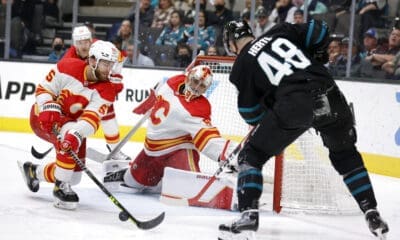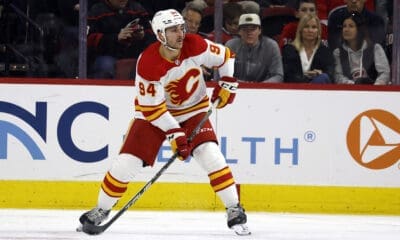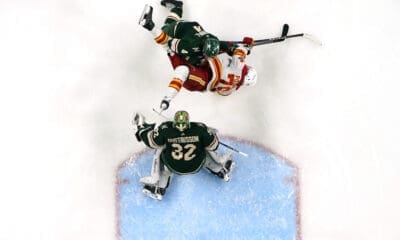Calgary Flames
13th Overall: The Why

The Flames own a pretty decent draft pick this year. Nothing great, to be sure, but 13th overall is nothing to whine about. So leading up to the draft, I’m going to write a few pieces called 13th Overall, which will basically discuss What positions/types of players the Flames should target, Why the Flames should target specific players within the categories listed here, and Who the players are that would fit that bill.
Everyone has different things they look at in a player- some see being massively huge as a boon, others just like to see lots of points. Still others like lots of points in awful leagues like the BCHL (still not over the drafting of Kris Chucko). So what attributes can we look at that will indicate development into a future NHL player?
What To Look For
Even Strength Scoring
A player who scores a large majority of their points at EV in their draft year is a player to watch for. Why? Well first, EV play is where most of the game takes place. A player who outscores others while at five apiece is clearly already well versed in the art of two-way play and is trusted by his coach in a lot more situations. Fact is- it's a lot harder to score there than it is on the PP- making those points significantly more impressive. I should point out here that evaluating young players based on both this and the next category is a development that largely exists due to the paucity of in-depth stats coming from international and junior leagues. The QMJHL is trending in the right direction with something resembling scoring chances tracked as well as shooting percentage, but that's the exception, not the rule.
Zero Point Games
Similar to EV Scoring, looking at a player's zero point games is another way to gain insight from simply looking at points. Often times junior players will have bursts of "luck" or simply ride good circumstances in individual games which results in them scoring inconsistently and riding percentages. The players to watch for are the ones who can score consistently- game in and game out. They are the players who consistently put pucks on net and drive possession. Couple that with the EV play and you have one hell of a solid and consistent player.
Youth
I’d like to make it clear that I’m not talking about avoiding overage players here- I’ll address that below. By youth I’m referring the Jeff Skinner Experience: that is, scoring well in your draft year, and barely being draftable. Teenagers develop a lot from year to year- a player who’s barely eligible to be drafted will do a lot more growing both physically and mentally than a player who just missed out on the last draft.
Jeff Skinner is the perfect example of this- he was barely 18 when the season began, but had grown and developed a lot during the latter half of his draft season and offseason. If a player who's nearly a year younger than the rest of his draft class is keeping up with them- chances are he'll grow a lot more than they will and could very well end up better than them.
Vision/"Hockey Sense"/Intelligence
One of those intagibles stats people (including myself) try so hard to avoid and yet find themselves staring down the barrel at so often. A lot of things can be taught or improved: shooting, skating, hitting, strength, and so on. This isn't one of them. It's a "You got it or you don't" type thing. It's what seperates Ovechkin, Crosby, Parise, the Sedins, and all the rest of the top players from the players who simply have the physical attributes and capabilities. It's the ability to think the game at a higher level- to anticipate the movement of the puck and the players on the ice. It allows a player to create plays or open ice where there was none and take it away where there was formerly plenty of it.
Give me a player who thinks the game at the next level, but probably needs to work on the physical and technical aspects of the game over the opposite any day.
What to (Generally) Ignore Or Avoid
PP Scoring
Remember Schrempy Hockey (Coming to a Winnipeg near you!)? Remember how he was this highly touted prospect who had pretty decent numbers in his draft year? Guess where nearly 70% of those numbers came from: the power play. He has yet to truly be an impact player at the NHL level, though you could argue that he’s developed to “not bad”. Similar situations apply to Sam Gagner as well. In fact- The Oilers Republic explains it quite well:
There is more to a player than points, production can be deceiving. Clearly mistakes are made when taking with a player a disproportional amount of power play points.
Size
Objectively speaking, size is a good thing. Unfortunately that mentality has turned into something resembling "Size is everything" and teams draft large players based on height/weight without regards to actual skill. This is an even larger problem with players from junior, where oftentimes a player will not need to develop any significant skills to become a top scorer if they're big enough. It's less of an issue for players who play at pro-level international leagues, such as the KHL or SM-Liiga.
It's high time GMs realized that being big is not the same as being good. And as for the weight issue- if a player is coming in looking thin and needing to put on muscle- it's not hard to fix. Put him in the weight room with a pile of cheeseburgers everyday.
Overagers
This is a natural extension of my arguing for youth above: a player who's playing extremely well after his draftable age is simply a more developed man dominating less developed boys. Not a bad pick to take a chance on later in the draft, but certainly not worth a 1st or 2nd round pick.
by Arik Knapp









